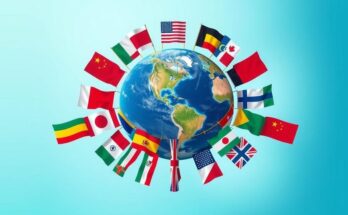Independent experts presented alarming human rights violations in Iran, Syria, and Venezuela during the latest UN Human Rights Council session, emphasizing the need for accountability and justice. Reports highlighted state-led repression, lack of electoral transparency, and severe mistreatments in detention across these nations.
During the latest session of the UN Human Rights Council, independent experts reported serious violations across Iran, Syria, and Venezuela. These discussions were crucial, highlighting the ongoing atrocities faced by individuals in these nations.
In Iran, following the protests triggered by Mahsa Amini’s death, fundamental rights violations were emphasized. Sara Hossain, chair of the Fact-Finding Mission on Iran, reported that during peaceful demonstrations, children suffered grievous injuries from metal pellet ammunition, and those detained faced severe mistreatment, including torture and rape.
Hossain noted that Iran’s authorities have not addressed public demands for justice and equality, stating, “For two years, Iran has refused to adequately acknowledge the demands for equality and justice that fuelled the protests in 2022.” She expressed concerns regarding the relentless repression of protesters and their families, particularly women and girls.
Shaheen Ali from the same mission remarked on the lack of confidence that victims have in Iran’s judicial process, stating, “We have heard from countless victims and survivors that they have neither confidence nor trust in Iran’s judicial and legal system.” He emphasized the need for external accountability measures in the absence of domestic justice.
The situation in Syria was brought to light by Paulo Pinheiro, head of the Commission of Inquiry on Syria. He underscored the need to uncover the fate of many who are missing due to the Assad regime’s actions, while also noting that the humanitarian crisis amid dwindling funding continues to worsen.
Pinheiro expressed his readiness to support efforts for truth and justice regarding the missing individuals, pointing out, “The clarification of the fates of the tens of thousands who remain disappeared will require a large-scale effort led by the caretaker authorities.” He called for preserving evidence that may be vital in these efforts.
In Venezuela, Marta Valiñas, chair of the Independent International Fact-finding Mission, reported a pattern of political repression and arbitrary detention, particularly in the buildup to the 2024 presidential elections. She raised concerns about the lack of transparency in the electoral process, stating, “Credible testimonies indicated that council members received political instructions to announce a predetermined result.”
Valiñas highlighted a troubling rise in detentions of opposition figures and violent crackdowns on protests, linking this to numerous rights abuses. Investigations confirmed fatalities during protests, including the deaths of seven individuals in Maracay due to government forces’ actions during demonstrations.
The report also shed light on the dire conditions within state custody, where many detainees were reported to have died from alleged health complications sustained through inhumane treatment and torture. The Venezuelan government dismissed these findings as biased, asserting that they were based on unsubstantiated claims.
In summary, the UN Human Rights Council’s recent discussions have spotlighted the alarming human rights violations occurring in Iran, Syria, and Venezuela. Reports highlighted the ongoing repression faced by protesters, as well as the lack of accountability for perpetrators of these violations. It is evident that comprehensive international efforts are imperative to address these grave injustices and restore rights and dignity to those affected.
Original Source: news.un.org




